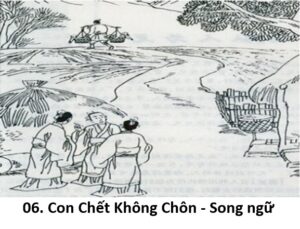Con Chết Không Chôn – The Dead Son Is About To Remain In The House – Song ngữ
English: Tetcheng Liao.
Việt ngữ: Hòa Thượng Thích Tâm Châu.
Compile: Middle Way Group.

The Dead Son Is About To Remain In The House – Con Chết Không Chôn
Once upon a time there was a man who brought up seven boys, one of whom died. Finding the son dead, he intended to leave the body in the house and moved out himself.
Xưa có người ngu dưỡng-dục được bảy người con. Một hôm có một đứa chết. Thấy con chết, người kia muốn để yên trong nhà, bỏ đi nơi khác.
A bystander said to him, “You know the living and the dead go separate ways. Since your son is dead, he should be quickly buried in a faraway place with all due solemnity. Now why do you want to leave your house and let your dead son remain here?” When the man heard this, he decided to bury his son and not let the corpse lie at home. He then thought he would have to kill another son to hang one body on each end of the pole to keep in equilibrium and carry them for burial in a long way off the forest. That seemed the only thing possible for him to do and he did it. His contemporaries laughed aloud at his unprecedented eccentricities.
Người hàng xóm thấy thế bảo: “Sinh, tử đôi đường, ông nên thu xếp chôn tại nơi xa, sao ông lại định để yên trong nhà và muốn bỏ đi nơi khác vậy?” Người ngu nghe nói liền nghĩ: “Không để được ở nhà phải đem chôn, thời giết thêm đứa nữa, gánh hai đầu cho cân!” Nghĩ rồi, người ngu giết ngay đứa nữa, để hai đầu, gánh đến cánh đồng xa chôn. Đương-thời ai ai cũng chê cười, ghê sợ.
A monk, who secretly broke one commandment, felt afraid to confess it. He would pretend that he had scrupulously kept all commandments and led a life free from evil and defilement. Some wise men might then tell him, “A monk should keep the commandments just like brilliant pearls should be protected from being damaged. How can you break what you have accepted? Now you are reluctant to confess them.”
Người tu đạo giải-thoát, phạm một giới, ngại hối-cải, im-lặng, che-giấu, tự nói là trong sạch. Có người biết bảo: “Người tu đạo giải-thoát giữ giới cấm như giữ ngọc minh-châu, không để rơi, sứt. Nay phạm những giới đã thụ, sao ông không sám-hối đi?”
The offender would answer, “Now that I have to confess, I might as well do more breakings. Then I’ll confess all my sins at once.”
Consequently, he broke more commandments by doing many evil things before his confession. This monk is just like that stupid man who kills another son when one dies.
Người kia đáp: “Nếu phải sám-hối, để phạm nữa, hãy xuất-tội luôn thể!”
Như người ngu kia, đây cũng thế!
Sources:
Tài liệu tham khảo:
- http://www.buddhism.org/Sutras/2/FablesSutra.htm
- https://tienvnguyen.net/a615/kinh-bach-du-sakyamuni-s-one-hundred-fables
- https://daitangkinh.net/?f=Kinh-Bach-Du/1#c2
- https://dspace2.creighton.edu/xmlui/handle/10504/82822
- https://quangduc.com/a32166/kinh-bach-du
- https://phatphapungdung.com/phap-bao/kinh-bach-du-thich-tam-chau-dich-113682.html
